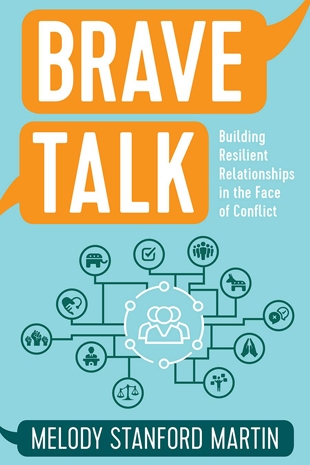"Here is a go-to reference for behaviors to avoid during difficult conversations. These are called "hazards" because they can totally derail productive discourse. Can you think of any to add to this list?
"l. Trolling. The internet term for provoking someone in order to knock them off balance is trolling. Some people do it unintentionally. When you're tempted to troll, consider your motives in the moment. Are you trying to win or create drama? Are you unearthing strong feelings in yourself or others that you don't want to deal with, so you're trying to create a distraction? Or are you truly trying to understand?
"2. Wearing the crown. This means being condescending or acting superior. Avoid this at all costs; it fosters resentment and power grabbing. You may be an awesome, well informed, or educated person, but that doesn't erase your need for human equality, for seeing and being seen. Let yourself be a human.
"3. Pontificating. Avoid using big words and ideas that no one else can speak to or giving long-winded speeches that don't allow for engagement. If you find yourself talking at other people, try using words of one or two syllables for a while. Try using shorter sentences and asking more questions. F or the sake of the conversation, challenge yourself to dial it back and share space.
"4. Bigfooting. Don't engage in 'bigfooting,' or spreading conspiracy theories that are unproductive. Yes, conspiracy theories are fun, but they are fundamentally unprovable. Stick to what you know that you know and what is reasonable to discuss with your conversation partner.
"5. Bunny trailing. Veering the conversation away from the heart of the matter — bunny trailing — may be intentional or unintentional. Either way, it causes missed opportunities by spending time on things that aren't relevant.
"6. All-speak. Another hazard is all-speak, or using grand, sweeping statements that can neither be proven nor refuted or trying to speak for everyone or an entire group of people. Stick to your social location, your experiences, your sources, your feelings, your convictions. These are enough. You don't have to be an expert.
"7. 'My neighbor Cathy.' [An example of] shaky logic, 'my neighbor Cathy' is the fallacy of wrongly assuming an isolated instance is the norm. It's like that one time your neighbor Cathy gave you cookies, and now you assume all your neighbors will always give you cookies.
"8. Downstreaming. Another mistake to avoid is downstreaming — getting stuck looking at the results without seeking to unpack causes. If you're studying the problem of a polluted lake, it would be a mistake not to look at the rivers that feed the lake. Instead of downstreaming, ask questions: What are the causes? What causes those causes? Who benefits from them?
"9. 2 + 2 = pickles. [This is] jumping to conclusions. Often people do this out of a frantic, insecure desire for resolution. You don't have to rush. Take your time, and don't be afraid to explore many options, even options you aren't likely to agree with. You don't need to decide everything or try to read someone's mind. No one can force you to believe anything you don't want to believe, so you don't have to be in a hurry deciding. You are in control.
"10. Shutting down. A final situation to avoid is one where you get to a state of no longer being able to engage, whether because someone feels emotionally unsafe or because someone has reached their limit of the conversation. If you feel yourself shutting down, first of all, acknowledge yourself for a good job of being self-aware. Consider sharing how you feel with the group; sometimes this can make your experience much easier for you and others to deal with because it's simply reality. Once you are aware of it, you can either work through it together or take a break. Both of these options are good. The only way you can fail is by shutting down but pretending you're fine.
"None of us are perfect at avoiding these hazards all the time, but the only way we can fail is to give up. As long as you keep trying, there is hope for growth. Good luck as you practice."
